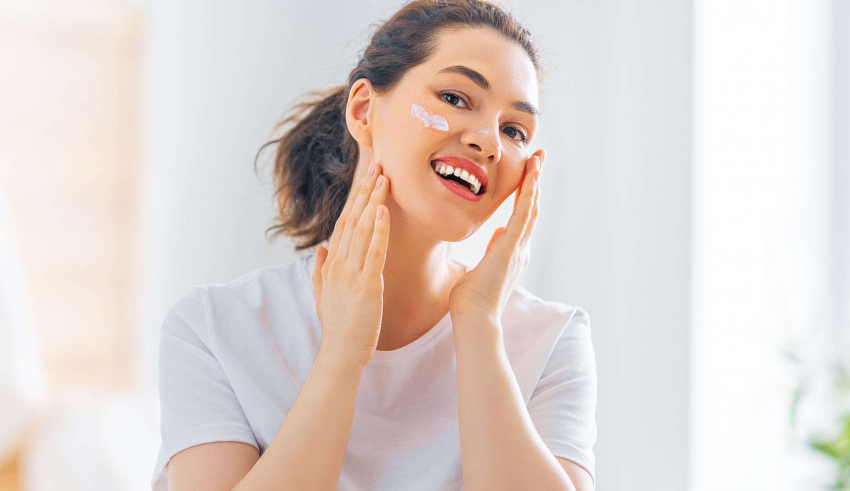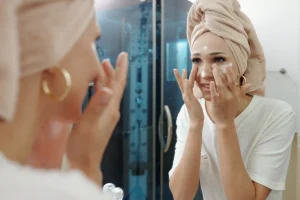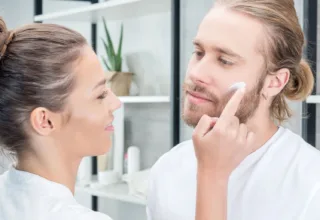
Do you want to stay young forever? We don’t know how to stop the clock, but we surely can help you fool the cameras and mirrors into thinking you’re a younger you. Taking care of your skin should be an essential part of your health regimen. Keep in mind that your skin is your largest body organ. With age, the level of collagen in the skin starts to decrease, leading to the appearance of signs of aging such as wrinkles and fine lines. However, like a bottle of wine, you can get better with age with the right care. To preserve the youthfulness of your skin and prevent the appearance of wrinkles, you must rely on effective anti-aging products. Keep on reading as we will be sharing with you everything you should know about skin aging in collaboration with the dermatologist and cosmetologist Dr. Jinane Gerbaka.
What are the signs and causes of skin aging?
There are three main signs of skin aging and each of them affects the skin in a different way:
1- Wrinkles and fine lines.
2- Loss of volume that leads to sagging skin and flattened cheeks.
3- Loss of elasticity and firmness.
Skin aging is due to a combination of both internal and external factors. Understanding these factors will help you take good care of your skin as it ages and reduce the visible signs of aging.
Internal causes of skin aging
- Hormonal influences
Low estrogen levels reduce the collagen in the skin, which leads to a loss of skin thickness and thus to skin sagging. - Blood supply
A poorer blood supply means that the delivery of nutrients and oxygen to the skin’s surface is impeded. Hence, the glow that characterizes young skin fades and the skin becomes dull. - Genetics
Genetics plays a key role in how skin ages. The phototype and skin type we are born with influence the speed at which signs of aging appear.
All of this happens naturally in our bodies as we age. But what about factors outside our bodies?
Extrinsic factors in skin aging
- Sun
The main external factor is exposure to the sun, which results in what is known as photo-aging skin, characterized by increased dryness and fragility, loss of elasticity, deep wrinkles, and irregular pigmentation.
- Pollution
Exposure to pollution, most often in cities, can trigger the release of free radicals that are harmful to the skin.
- Smoking
The chemicals and nicotine contained in cigarettes are responsible for the increase in the number of free radicals in the skin. Smoking damages collagen and elastin, noting that smokers’ repetitive facial expressions can turn into wrinkles.
- Bad nutrition
Antioxidants are molecules that have the ability to neutralize the free radicals that damage the skin and accelerate its aging. Having lots of antioxidant-rich fruits and vegetables is an easy way to take care of our skin as it ages.
- Inappropriate skin care
The skin ages more quickly if you’re not taking care of it or if you use products that irritate the skin. Thorough cleansing with gentle products adapted to your skin type and regular application of skin care products targeted to your skin’s primary concern will help you take good care of your skin.
What are the best anti-aging ingredients for skin care?
The effectiveness of anti-aging products depends on your skin type and most importantly on the active ingredients the products contain. Some of the most effective anti-aging ingredients to look for are :
*Retinoids: This term refers to vitamin A compounds such as retinol. These ingredients have long been used topically to help repair sun-damaged skin and reduce fine lines and wrinkles. Dr. Jinane Gerbaka also indicates that retinol is one of the best ingredients to lighten the skin.
*Antioxidants: Vitamin C is a potent antioxidant that may help protect the skin from sun damage and reduce fine lines and wrinkles. As Dr. Jinane Gerbaka explains, vitamin C also has a brightening effect. Also don’t forget vitamin E, which is essential for maintaining youthful skin.
*Hydroxy acids: such as glycolic and lactic acid used to remove dead skin cells.
*Niacinamide: It helps reduce water loss and improve skin elasticity.
What is the best anti-aging skin care routine?
An anti-aging skin care routine should always consist of three steps: cleanse, care and protect.
1- Cleanse to remove make-up, dirt and chemicals from the skin. Regardless of your skin type or skin care concerns, daily cleansing is must.
2- Care to replenish and hydrate the skin with products that address your primary aging concerns. Applying an anti-aging serum is the next step after cleansing and before moisturizing. This will help nourish, protect, and hydrate your skin. We recommend you try A-Oxitive Antioxidant Defense Serum from Eau Thermale Avene, a prominent brand in the field of skin care. This anti-aging facial treatment is a fast-absorbing, powerful antioxidant serum. Rich in vitamin C and vitamin E, it eliminates free radicals caused by environmental and lifestyle aggressions while visibly plumping the skin to preserve a younger and brighter complexion.
 The area around the eyes is one of the first places to show signs of aging, but by following a regular skin care routine, you will move away from the ghost of aging , eye wrinkles, and preserve your youthfulness. Your first and most powerful weapon is an anti-aging eye cream that you should apply in the morning or evening, to get rid of wrinkles under the eyes and tighten the skin. A-Oxitive Eyes Smoothing Eye Contour Cream is exactly what you need! Rich in vitamin E, it protects the skin against the harmful effects of free radicals and delays the appearance of fine lines and wrinkles around your eyes.
The area around the eyes is one of the first places to show signs of aging, but by following a regular skin care routine, you will move away from the ghost of aging , eye wrinkles, and preserve your youthfulness. Your first and most powerful weapon is an anti-aging eye cream that you should apply in the morning or evening, to get rid of wrinkles under the eyes and tighten the skin. A-Oxitive Eyes Smoothing Eye Contour Cream is exactly what you need! Rich in vitamin E, it protects the skin against the harmful effects of free radicals and delays the appearance of fine lines and wrinkles around your eyes. Dr. Jinane Gerbaka points out that if you also have dark circles, you can use creams to whiten the skin or apply a peel around the eyes to help regenerate the skin.Next up is a day cream. A-Oxitive Day Smoothing Water Cream has been specially formulated to address the first signs of aging such as fine lines and wrinkles. Thanks to its powerful antioxidants and moisturizing agents, this anti-aging moisturizer protects the skin from daily aggressions and leaves it nourished all day long.
Dr. Jinane Gerbaka points out that if you also have dark circles, you can use creams to whiten the skin or apply a peel around the eyes to help regenerate the skin.Next up is a day cream. A-Oxitive Day Smoothing Water Cream has been specially formulated to address the first signs of aging such as fine lines and wrinkles. Thanks to its powerful antioxidants and moisturizing agents, this anti-aging moisturizer protects the skin from daily aggressions and leaves it nourished all day long. Be mindful that you shouldn’t forget to use your anti-aging night cream before you hit the sack as it promotes cell renewal while you sleep. A-Oxitive Night Peeling Cream contains the renewing complex [Retinaldehyde and ProVitamin E] which stimulates cell activity, evens out skin texture and helps protect the skin against free radicals.
Be mindful that you shouldn’t forget to use your anti-aging night cream before you hit the sack as it promotes cell renewal while you sleep. A-Oxitive Night Peeling Cream contains the renewing complex [Retinaldehyde and ProVitamin E] which stimulates cell activity, evens out skin texture and helps protect the skin against free radicals. Nowadays, people are getting injectables and fillers as forms of “self-care” instead of creams/serum. However, Dr. Jinane Gerbaka states that injectables and creams complement each other. She recommends treating the skin beforehand with serum and creams because when you have good skin, you get a better result with botox and filler afterwards. Dr. Jinane Gerbaka also adds that if you have oily skin, go for a serum. However, if you have dry skin, always add cream on top of the serum.
Nowadays, people are getting injectables and fillers as forms of “self-care” instead of creams/serum. However, Dr. Jinane Gerbaka states that injectables and creams complement each other. She recommends treating the skin beforehand with serum and creams because when you have good skin, you get a better result with botox and filler afterwards. Dr. Jinane Gerbaka also adds that if you have oily skin, go for a serum. However, if you have dry skin, always add cream on top of the serum.
3- Protect. Protecting the skin from the sun’s rays, even on cloudy days, is the most important step in fighting against skin aging. As discussed, the sun is responsible for many of the visible signs of aging. So, don’t forget to apply sunscreen as it’s a safe way to keep your skin as young as possible.
What are some tips for getting the most out of your anti-aging creams?
- Choose the suitable cream for your skin type.
- Drink plenty of water. According to Dr. Jinane Gerbaka, it is very important to keep your skin hydrated. Otherwise, your skin will be less radiant and less moisturized.
- Stop smoking.
- Maintain an adequate amount of sleep, which is when cell regeneration is most active.
- Eat a well-balanced diet, rich in vegetables and fruits.
Aging is definitely a process that most people would like to slow. It is therefore time to reconsider your everyday creams and serums and choose only those that are proven to be effective in reducing fine lines and wrinkles.
Last Updated on February 23, 2024









